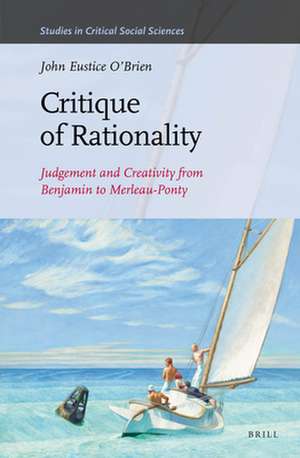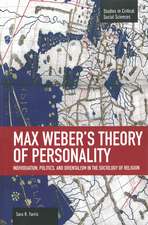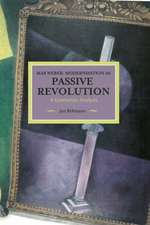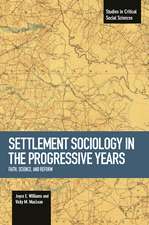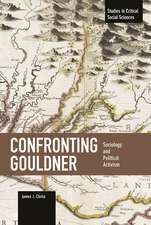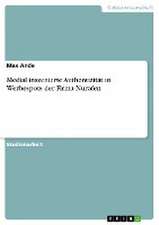Critique of Rationality: Judgement and Creativity from Benjamin to Merleau-Ponty: Studies in Critical Social Sciences, cartea 99
Autor John E. O'Brienen Limba Engleză Hardback – 22 sep 2016
Din seria Studies in Critical Social Sciences
-
 Preț: 257.21 lei
Preț: 257.21 lei -
 Preț: 230.50 lei
Preț: 230.50 lei -
 Preț: 258.43 lei
Preț: 258.43 lei -
 Preț: 215.12 lei
Preț: 215.12 lei -
 Preț: 214.03 lei
Preț: 214.03 lei -
 Preț: 216.32 lei
Preț: 216.32 lei -
 Preț: 214.79 lei
Preț: 214.79 lei -
 Preț: 214.59 lei
Preț: 214.59 lei -
 Preț: 269.42 lei
Preț: 269.42 lei -
 Preț: 214.86 lei
Preț: 214.86 lei -
 Preț: 85.13 lei
Preț: 85.13 lei -
 Preț: 178.51 lei
Preț: 178.51 lei -
 Preț: 215.20 lei
Preț: 215.20 lei -
 Preț: 257.49 lei
Preț: 257.49 lei -
 Preț: 257.17 lei
Preț: 257.17 lei -
 Preț: 214.33 lei
Preț: 214.33 lei -
 Preț: 150.65 lei
Preț: 150.65 lei - 18%
 Preț: 870.64 lei
Preț: 870.64 lei - 23%
 Preț: 1142.84 lei
Preț: 1142.84 lei - 18%
 Preț: 1091.44 lei
Preț: 1091.44 lei - 18%
 Preț: 711.99 lei
Preț: 711.99 lei - 18%
 Preț: 795.46 lei
Preț: 795.46 lei -
 Preț: 229.94 lei
Preț: 229.94 lei -
 Preț: 390.36 lei
Preț: 390.36 lei -
 Preț: 223.37 lei
Preț: 223.37 lei -
 Preț: 351.11 lei
Preț: 351.11 lei -
 Preț: 226.24 lei
Preț: 226.24 lei -
 Preț: 229.55 lei
Preț: 229.55 lei -
 Preț: 230.71 lei
Preț: 230.71 lei -
 Preț: 268.43 lei
Preț: 268.43 lei -
 Preț: 225.87 lei
Preț: 225.87 lei -
 Preț: 228.59 lei
Preț: 228.59 lei -
 Preț: 226.67 lei
Preț: 226.67 lei -
 Preț: 226.67 lei
Preț: 226.67 lei -
 Preț: 349.55 lei
Preț: 349.55 lei -
 Preț: 228.59 lei
Preț: 228.59 lei -
 Preț: 223.80 lei
Preț: 223.80 lei -
 Preț: 186.78 lei
Preț: 186.78 lei -
 Preț: 226.67 lei
Preț: 226.67 lei -
 Preț: 231.46 lei
Preț: 231.46 lei -
 Preț: 229.55 lei
Preț: 229.55 lei -
 Preț: 231.46 lei
Preț: 231.46 lei -
 Preț: 269.42 lei
Preț: 269.42 lei -
 Preț: 190.70 lei
Preț: 190.70 lei -
 Preț: 273.26 lei
Preț: 273.26 lei -
 Preț: 312.59 lei
Preț: 312.59 lei -
 Preț: 196.41 lei
Preț: 196.41 lei -
 Preț: 269.42 lei
Preț: 269.42 lei -
 Preț: 232.45 lei
Preț: 232.45 lei -
 Preț: 190.65 lei
Preț: 190.65 lei
Preț: 716.04 lei
Preț vechi: 873.21 lei
-18% Nou
Puncte Express: 1074
Preț estimativ în valută:
137.02€ • 143.35$ • 113.82£
137.02€ • 143.35$ • 113.82£
Carte indisponibilă temporar
Doresc să fiu notificat când acest titlu va fi disponibil:
Se trimite...
Preluare comenzi: 021 569.72.76
Specificații
ISBN-13: 9789004272736
ISBN-10: 9004272739
Pagini: 312
Dimensiuni: 155 x 235 mm
Greutate: 0.57 kg
Editura: Brill
Colecția Brill
Seria Studies in Critical Social Sciences
ISBN-10: 9004272739
Pagini: 312
Dimensiuni: 155 x 235 mm
Greutate: 0.57 kg
Editura: Brill
Colecția Brill
Seria Studies in Critical Social Sciences
Cuprins
Preface
Acknowledgements
List of Figures
PART I: WHAT CRISIS OF RATIONALITY?
Socrates, Make Music...
1. Overview
Institutional Challenge
Social Restructuring of Judgment
Another Epistemology?
Political Aesthetics after Marx
2. Meaning As Critical for Social Sciences
The Origin of Meaning
Phenomenology
Merleau-Ponty’s Apperceptive Project
Préobjectivity: A Better Ambiguity?
Theoretical Voices on Deep Structure
Marx Critique
3. Isaiah Berlin’s Romantic Uncertainty
Western Rationality’s Limits?
Children of Two Worlds
Romantic Undefinability
Beyond Enlightenment
Pre-Romantic Good
From Hume to the Germans?
Romanticism’s Parents
Romanticism Restrained
Kant’s Reserves
Schiller’s Tragic Romanticism
Fichte’s Freedom As Necessity
Romanticism Unleashed
The French Revolution and Goethe
Against Old Fashioned Virtue?
Subjective—Objective Reversal?
Romanticism’s Politics
4. Walter Benjamin’s Aesthetic Critique
Benjamin’s Doctoral Trial
What Does the Figure, Aesthetic-Critique, Intend?
Pure Language or Creative Expression?
Historical-Materialism or Historical-Idealism?
Lost In The Paris Arcades
On Critique
Hegel and History
Benjamin’s Leap into Being
What Is Mental Reflection?
What Is a History of Problematics?
Knowledge of Nature
Connaissance Esthetique
Political Esthetics
Benjamin’s Translator Emerges
Immanent Critique
Three Principles of Judgment
Productivity of Bad Art
Unprincipled Objectivity
Were the Early Romantics Misread?
Irony of Ironies: There Are Two
The Paradox of Irony
From Disqualified Illusion to Potent Fetish
Between the Seams with Irony
Critical Eschatology?
On the Impossibility of Ironic Suicide
There Is Form and There is Form...
The Idea of Art, Then
Unity and Diversity
Determined Idea
Transcendental Leverage
Symbolic Form as Fact and Manner
Novel Supremacy as Romantic Poetry
The Intention of Prose
Romanticism as Cultural Figure
Prosaic Appreciation Outmaneuvers Bourgeois Beauty
Each Critic for Herself
Closing on Isaiah Berlin
Closing on Walter Benjamin
Revolutionary Possibilities
What’s To Be Done?
PART-II PHENOMENAL APPERCEPTION
5. The Crisis Of Western Rationality
Existence as Fine Art?
Introducing Merleau-Ponty
6. Phenomenology of Perception
Not Sartre
What is Phenomenology?
What is Perception?
Préobjectivity
Historical Materialism of Social Being
Existential Conception of History
Dialectics from the Greeks to Marx
Temporality
Political Aesthetics
Freedom
7. Merleau-Ponty’s Sociology
Anthropology and Psychoanalytics
On Husserl
Appreciation before Comprehension
Husserl’s Crisis
Historical Relativism as Anthropological Fact
Philosophy and Sociology
Historical Consciousness
Being Expressed as Phenomenological Method
8. Merleau-Ponty Shadow’s Husserl
Husserl’s Intellectualist Phenomenology
Merleau-Ponty’s Engaged Phenomenology
In the Wake of the Negative
Intersubjective Flash of Meaning
Mobius Ribbon of Being
Intentionality and Constitution
9. Aesthetic Consciousness
Overview
Summarizing Merleau-Ponty
Préobjective Precocity
Consciousness and Bodily-Being
Consciousness as Active Presence
10. Closing Issues: Consciousness over Mind?
Remaining Questions
Auto-Critique
Meaning: The Material of History
Rational Analytics of Brain
Consciousness Is More Than What You Think
An Appeal to Social-Philosophy
Consciousness vs Conscious-Access
The Risk of Systemic Exuberance
Intuition and Public Choice
Social Cognition
The Elusive Seat of Consciousness
Summarizing Our Bi Studies
Political Aesthetics: Consciousness and Society
Closing
Bibliography
Index
Acknowledgements
List of Figures
PART I: WHAT CRISIS OF RATIONALITY?
Socrates, Make Music...
1. Overview
Institutional Challenge
Social Restructuring of Judgment
Another Epistemology?
Political Aesthetics after Marx
2. Meaning As Critical for Social Sciences
The Origin of Meaning
Phenomenology
Merleau-Ponty’s Apperceptive Project
Préobjectivity: A Better Ambiguity?
Theoretical Voices on Deep Structure
Marx Critique
3. Isaiah Berlin’s Romantic Uncertainty
Western Rationality’s Limits?
Children of Two Worlds
Romantic Undefinability
Beyond Enlightenment
Pre-Romantic Good
From Hume to the Germans?
Romanticism’s Parents
Romanticism Restrained
Kant’s Reserves
Schiller’s Tragic Romanticism
Fichte’s Freedom As Necessity
Romanticism Unleashed
The French Revolution and Goethe
Against Old Fashioned Virtue?
Subjective—Objective Reversal?
Romanticism’s Politics
4. Walter Benjamin’s Aesthetic Critique
Benjamin’s Doctoral Trial
What Does the Figure, Aesthetic-Critique, Intend?
Pure Language or Creative Expression?
Historical-Materialism or Historical-Idealism?
Lost In The Paris Arcades
On Critique
Hegel and History
Benjamin’s Leap into Being
What Is Mental Reflection?
What Is a History of Problematics?
Knowledge of Nature
Connaissance Esthetique
Political Esthetics
Benjamin’s Translator Emerges
Immanent Critique
Three Principles of Judgment
Productivity of Bad Art
Unprincipled Objectivity
Were the Early Romantics Misread?
Irony of Ironies: There Are Two
The Paradox of Irony
From Disqualified Illusion to Potent Fetish
Between the Seams with Irony
Critical Eschatology?
On the Impossibility of Ironic Suicide
There Is Form and There is Form...
The Idea of Art, Then
Unity and Diversity
Determined Idea
Transcendental Leverage
Symbolic Form as Fact and Manner
Novel Supremacy as Romantic Poetry
The Intention of Prose
Romanticism as Cultural Figure
Prosaic Appreciation Outmaneuvers Bourgeois Beauty
Each Critic for Herself
Closing on Isaiah Berlin
Closing on Walter Benjamin
Revolutionary Possibilities
What’s To Be Done?
PART-II PHENOMENAL APPERCEPTION
5. The Crisis Of Western Rationality
Existence as Fine Art?
Introducing Merleau-Ponty
6. Phenomenology of Perception
Not Sartre
What is Phenomenology?
What is Perception?
Préobjectivity
Historical Materialism of Social Being
Existential Conception of History
Dialectics from the Greeks to Marx
Temporality
Political Aesthetics
Freedom
7. Merleau-Ponty’s Sociology
Anthropology and Psychoanalytics
On Husserl
Appreciation before Comprehension
Husserl’s Crisis
Historical Relativism as Anthropological Fact
Philosophy and Sociology
Historical Consciousness
Being Expressed as Phenomenological Method
8. Merleau-Ponty Shadow’s Husserl
Husserl’s Intellectualist Phenomenology
Merleau-Ponty’s Engaged Phenomenology
In the Wake of the Negative
Intersubjective Flash of Meaning
Mobius Ribbon of Being
Intentionality and Constitution
9. Aesthetic Consciousness
Overview
Summarizing Merleau-Ponty
Préobjective Precocity
Consciousness and Bodily-Being
Consciousness as Active Presence
10. Closing Issues: Consciousness over Mind?
Remaining Questions
Auto-Critique
Meaning: The Material of History
Rational Analytics of Brain
Consciousness Is More Than What You Think
An Appeal to Social-Philosophy
Consciousness vs Conscious-Access
The Risk of Systemic Exuberance
Intuition and Public Choice
Social Cognition
The Elusive Seat of Consciousness
Summarizing Our Bi Studies
Political Aesthetics: Consciousness and Society
Closing
Bibliography
Index
Notă biografică
John Eustice O'Brien, Ph.D. (Wisconsin, 1971), formerly Professor of Sociology and Urban Studies, Portland State University, Oregon, now independent researcher in Paris, recently published, Critical Practice from Voltaire to Foucault (Brill, 2014) and two articles on the Global Political Economy in Critical Sociology (2015 & 2016).
